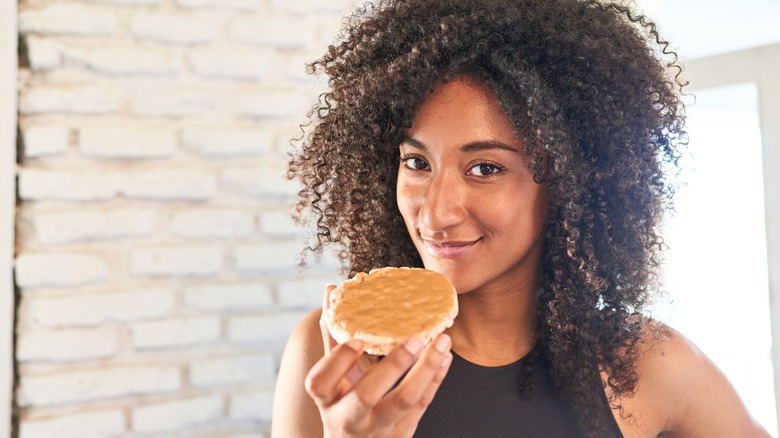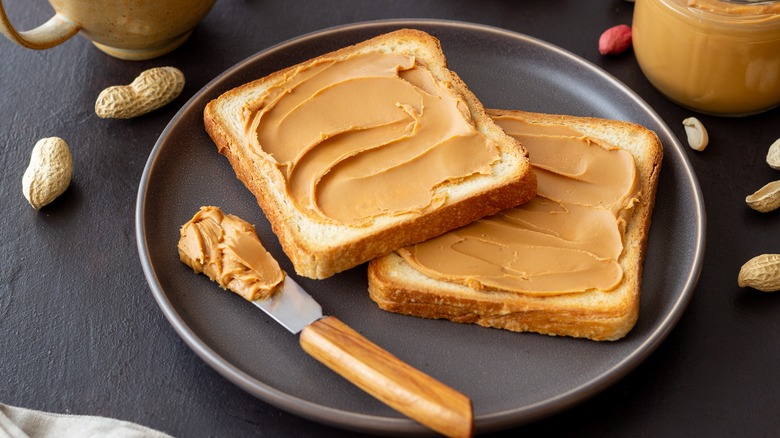What Happens To Your Cholesterol When You Eat Lots Of Peanut Butter
Peanut butter is one of those foods that can remind you of childhood. Whether you spread it on apples or added some jelly to your peanut butter to make a classic sandwich, peanut butter was an easy way for your mom to get some nutrition in your growing body.
Peanut butter isn't just for kids, though. Peanut butter can aid in weight loss because its protein, fat, and fiber can help you feel satisfied after eating. Bodybuilders enjoy peanut butter to help them build and repair muscles. People with diabetes might want to add peanut butter to their meals because it can help manage blood sugar levels (per Medical News Today).
If you're trying to manage your cholesterol, the peanuts in your favorite spread might also assist your cholesterol levels, according to a 2014 article in The American Journal of Clinical Nutrition. People whose cholesterol levels were above 200 saw a 12-point average decrease in their cholesterol levels after eating peanuts every day for 12 weeks. You have to be careful not to eat too much peanut butter, though, because it's also high in some unhealthy fats.
The fats in peanut butter are good and bad for cholesterol
Three types of fats can be present in different foods. Trans fats, also known as partially hydrogenated oils, are processed oils that are solidified. You'll find trans fats in fried foods, baked goods, and some of your favorite pie crusts. Because trans fats can raise your LDL cholesterol, the American Heart Association suggests nixing trans fats from your diet altogether. Peanut butter has no trans fats.
Saturated fats are typically found in animal products such as beef, lamb, cheese, and whole milk. Some plant-based foods like coconut and palm oils have saturated fat as well. Two tablespoons of peanut butter have 3 grams of saturated fat. The American Heart Association suggests keeping your saturated fat intake to 11 to 13 grams a day to lower your cholesterol. In other words, you don't want to be adding peanut butter to all your meals.
Monounsaturated and polyunsaturated fats can improve your cholesterol levels if eaten in moderation. It's also a good idea to replace foods high in saturated and trans fats with healthy unsaturated fats. Unsaturated fats are found in salmon, trout, avocados, and olives. Peanut butter gives you 10 total grams of unsaturated fat per two tablespoon serving.
Other nutrients in peanut butter are good for your heart
Although the unsaturated fat in peanut butter could improve your cholesterol levels, other ingredients also make peanut butter good for your heart. According to WebMD, the arginine in peanut butter can widen your blood vessels. Peanut butter also has the antioxidants coumaric acid and resveratrol to fight off free radicals.
Eating a lot of peanut butter might not be great if you're trying to reduce your daily sodium or cut calories. You'll get 152 milligrams of sodium in peanut butter, which is about 10% of what's recommended each day. Peanut butter might be a great additive to a protein shake, but two tablespoons will add 188 calories to that shake.
You'll have to be choosy when choosing peanut butter. Some have added sugar and other ingredients that can make them less healthy (per WebMD). Check the ingredient label and choose peanut butter that has just peanuts and salt. You might need to stir them because the oil typically separates from the paste. Some grocery stores are equipped with grinders so you can grind your own to ensure your peanut butter's purity.



